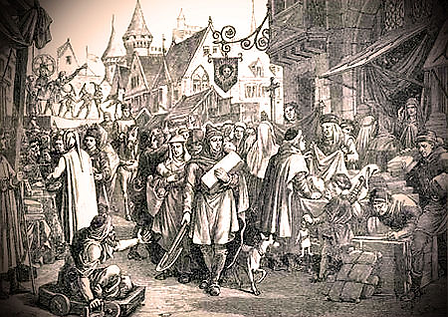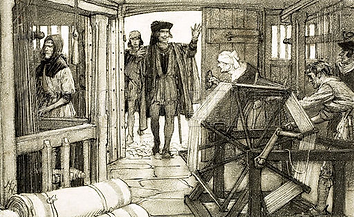
The Charter and Context
A charter is a written document instrumenting the transfer of property, rights or privileges. Charters were firmly established as tools of conveyance in medieval Britain by the 10th century (Castle, K.M. Gervers, M. 2015).


King Henry III of England's Charter, 7th March, 1262
Verso.
Recto.
The charter measures 245mm x 170mm.
The wax seal has a 100mm diameter.
The seal hangs from a 55mm cord.
What does it say?
Henry by the grace of God King of England, Lord of Ireland and Duke of Aquitaine to his Sheriffs and Ministers of the County of Lincoln greeting.
We have inspected the letters which the Lord King Henry my grandfather made to the citizens of Lincoln in these words:-
Henry King of the English and Duke of the Normans and Aquitanians and Count of the Angevins to his sheriffs and ministers of Lincolnshire greeting.
I command that ye cause the foreign merchants to come to Lincoln and there to deal with their merchandize as reasonably and justly as they were wont to deal in the time of King Henry my grandfather, lest my provosts of Lincoln lose my royal customs.
Witness : Richard de Lucy at Woodstock.
And we grand for ourselves and our heirs that this be observed forthwith by the same citizens under our penalty of ten pounds.
In witness whereof we have caused these our letters to be made patent.
Witness me myself at Windsor on the seventh day of March in the forty-sixth year of our reign (Birch, Walter de Gray. 1911, 14-15).
A 1911 translation by the English historian Walter de Gray Birch.
What does it mean?
King Henry III confirms and declares that the regulations relating to “foreign” merchants are to remain in force, under the penalty of ten pounds. This was considered a large sum of money, where a sheep could be purchased for a few pence (Birch, Walter de Gray. 1911, xix).


What are the Woodstock Charters?
The Woodstock charters, given by Henry II state that foreign merchants are to come to Lincoln and carry out their business. They declare that foreign merchants may take up residence in Lincoln to dye and sell cloths, and that they must pay the same royal taxes as the citizens of Lincoln. (Birch, Walter de Gray. 1911, xxii).
The palace of Woodstock, Oxfordshire. © Wikipedia
Foreign Trade and Market Towns.
“The Keeper of the Fair” and “Buyers of the Wardrobe” were assigned with purchasing goods for the crown from market fairs, and this was usually done with credit.
However, the king frequently failed to repay this, and the local and foreign merchants became royal creditors.
In one form of security provided by the king, local collectors of royal revenues would be responsible for paying the merchants their bills of wardrobe (Bell, A. R. Brooks, C. Moore, T. K. 2014).

A market fair in Champagne, France in the 13th century, engraving in Album historique, publié sous la direction de M. Ernest Lavisse (1898), Paris, Armand Colin & Cie.
© Wikipedia
Foreign Merchants in Lincoln.
Dietrich of Cologne, a German merchant who resided in Stamford, Lincolnshire, found favour with the king and acquired himself a licence to export cloth and wool.
In 1229 there are records of Dietrich exporting wares from the provincial town of Stamford, which lies on the border of Northamptonshire. He was appointed the post of “Keeper of the Fair” in 1245, where he purchased goods for the Crown at the Stamford fair.
For several weeks in the year, Stamford became one of the most famous international fairs in England, which was renowned for manufacturing cloth of the highest quality and for wool export.
Dietrich bought up land and houses in the town and took advantage of the needs of those whose houses he bought. He bought houses from those who needed to free themselves from debts owed to Jewish money lenders, or who had to sell due to poverty.
His activities provide a strong depiction of the economic crisis that all classes of society experienced between 1230-1240 (Rowlands, I.W. Weiler, B.K.U. (2016).

An illustration of a Flemish cloth merchant. © Discovering Belgium
Foreign Merchants and The King.
Complaints from Henry’s critics in 1258:
‘the lord king scarcely ever pays for his prises, so that many English merchants are impoverished beyond measure, while [foreign] merchants for this reason refuse to come with their goods into the kingdom, wherefore the land suffers grievous loss’. (Bell, A. R. Brooks, C. Moore, T. K. 2014)

Manuscript portrait of Henry III of England (1207-1272), with a façade of Westminster Abbey, by Peter of Langtoft, 1307-1327. © Discover Britain
New Legislation.
Between 1258 to 1261, the King had to offer improved terms to encourage foreign trade to return to British markets.
The king confirmed trading privileges for foreign merchants, that should they default on their debts to fellow townsmen, their goods could not be lawfully seized by the townspeople. This was one of the ways local merchants could recoup the loans they were owed.
Additionally to this, the king granted them exception from a local tax imposed by towns for the maintenance of their walls, bridges and roads – for five years (Bell, A. R. Brooks, C. Moore, T. K. 2014).

Hanseatic port of Hamburg, manuscript illumination from the Hamburg City Charter of 1497. © Britannica

How did this affect Lincoln?
Through the interpretation of these historical records, we can begin to understand the context in which the 1262 charter had been made. It could be imagined that those “native” to England had felt second-class to such foreign merchants who, who seemed to have evaded the economic crisis of Henry III’s rule.
The charter implies that the sheriffs and ministers of Lincolnshire had requested for a change in the regulations that governed the “foreign merchants”. Written during the 1258-1265 reformation, it may have been a reflection of an attitude felt towards the foreign merchants and the economy.
Later In 1263, the king ordered the foreign merchants to be repaid £1,031 from the revenues of the judicial eyre in Lincolnshire (Bell, A. R. Brooks, C. Moore, T. K. 2014).
Ten years on, feelings towards the foreign merchants appear to have unchanged. In King Henry III's final charter addressed to Lincoln in 1272, he responds to the citizens of Lincolnshire complaining of foreign merchants trading in neighbouring places (Birch, Walter de Gray. 1911, xx-xxii).
